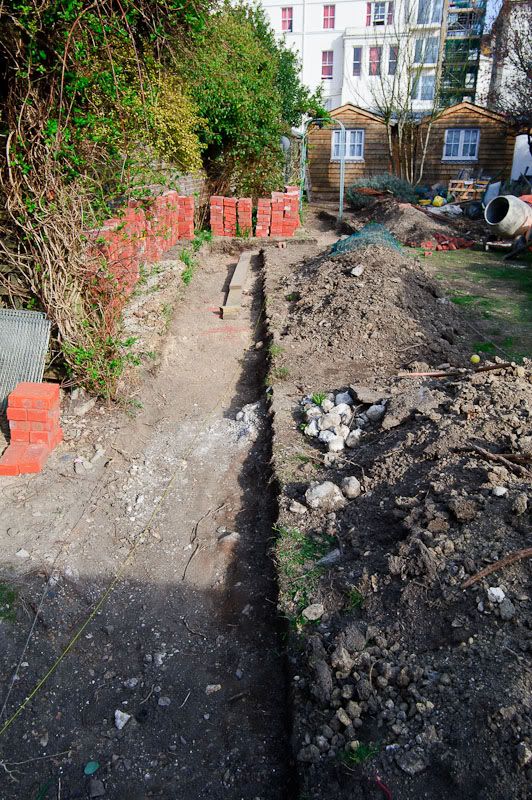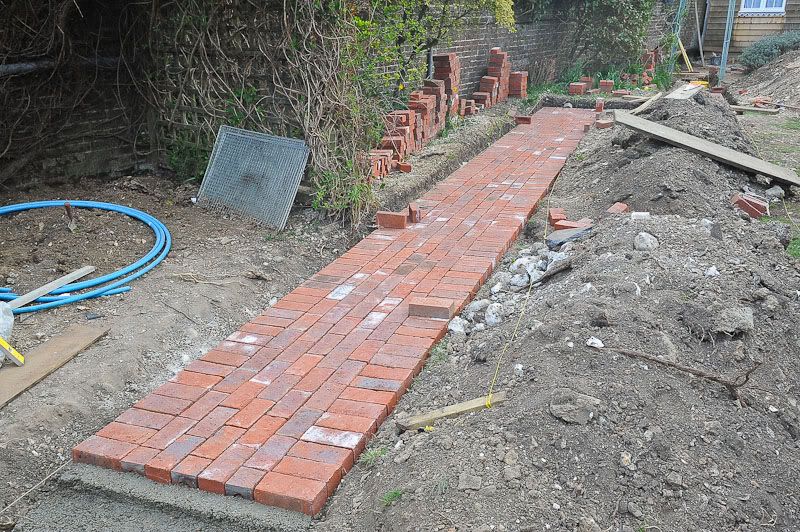Page 1 of 2
Posted: Fri Mar 12, 2010 10:06 pm
by Triggaaar
I've just spent the last couple of hours reading through the FAQs and old threads - there's loads of great info and I'm glad I've found this site before making a mess of my garden.
I would like to lay a garden path, which will be 3 feet wide and about 80 feet long. I'm planning on going for a stretcher bond with the edges perpendicular to the length, using clay pavers (200x100x50 or 60mm).
I'm plaaning on doing this with my brick layer/odd job tradesman. He has done a fair bit of this before, but looking at this site I'm guessing he won't have done much of it perfectly. Together we layed my drive, and reading this site it looks like we did it about right, but I wish I'd broken up some of the old hardcore a bit more (some old lumps of concrete/brick etc, but we did cover with mot and use a vibrator, followed by sand). We also did a rigid path with granite blocks at my old house, and that was fine, but again, reading here, it might crack one day (basically 2 feet wide, 3" of concrete base with granite blocks on top).
Now that I've found this place, I'd like to make sure my new garden path isn't at risk of failing after a few years. So my first question, is should we go for a flexible or rigid system? Assuming that either would work if done correctly, I'd like to go with the cheapest option.
Thanks
Posted: Sat Mar 13, 2010 12:19 am
by matty brock
I would lay my edges to a string line giving level and line on a semi dry mix and haunch both sides.
After it has gone off, lay and compact your sand and screed with a notched peice of timber to get your laying course level. (notch your timber block minus -5mm for 50mm block and block minus- 8mm for 60mm block, that works for me)
I would excavate 175mm for a garden path-75mm stone, 40mm sand, 60mm block.
Good luck mate :;):
Posted: Sat Mar 13, 2010 1:31 am
by Triggaaar
matty brock wrote:
Thanks Matt
I would lay my edges to a string line giving level and line on a semi dry mix and haunch both sides.
Laying the edges to string sounds like a good plan. What's the advantage of a semi dry mix?
After it has gone off, lay and compact your sand and screed with a notched peice of timber to get your laying course level.
Should you use a vibrator/whacker over the stone and/or sand before laying the paving?
I would excavate 175mm for a garden path-75mm stone, 40mm sand, 60mm block.
Thanks. To someone who doesn't understand how it all works, 40mm of sand sounds like a lot - what does 40mm of sand do that (say) 20mm wouldn't do?
From reading here I understand that a rigid base could crack, where a flexible base would flex - but if the flexible system had the edges on a lean mix, would that not be prone to cracking as with a fully rigid system? If the lean mix makes it more flexible, would that not be a good option for the whole base?
Thanks
Posted: Sat Mar 13, 2010 6:58 am
by msh paving
read this from the main site everything you need to know
read me i'm a page from main site
MSH 
Posted: Sat Mar 13, 2010 9:41 am
by Tony McC
For a 900mm wide path in a garden, it all depends on the blocks to be used. If you were using, say, 200x100mm blocks and wanted a 200mm wide edge course to each side, that would leave only 500mm of body blocks, so it's debatable whether it's worth constructing that as a fully flexible structure. It could be built as 100mm of sub-base with both edge courses and body blocks bedded onto 40mm of lean-mix mortar/concrete (10:1 or 1:3:6).
There *will* be movement of the path over the years. Garden paths are notorious for it due to the presence of so much topsoil, root zones, trees and critters such as moles and rabbits. However, there's a lot to be said for a garden path that has developed a bit of character. 
Posted: Sat Mar 13, 2010 10:43 am
by Triggaaar
Tony McC wrote:It could be built as 100mm of sub-base with both edge courses and body blocks bedded onto 40mm of lean-mix mortar/concrete (10:1 or 1:3:6).
There *will* be movement of the path over the years. Garden paths are notorious for it due to the presence of so much topsoil, root zones, trees and critters such as moles and rabbits. However, there's a lot to be said for a garden path that has developed a bit of character. 
I've already read that and the page on rigid bases, but since I'm not experienced with these things it's difficult to know how to adapt the design for my project.
If you were using, say, 200x100mm blocks and wanted a 200mm wide edge course to each side, that would leave only 500mm of body blocks, so it's debatable whether it's worth constructing that as a fully flexible structure.
Yes that is the planned path layout (I could change it if it's not a good option).
It could be built as 100mm of sub-base with both edge courses and body blocks bedded onto 40mm of lean-mix mortar/concrete (10:1 or 1:3:6).
How is a lean mix an advantage over a rigid base - I assumed a lean mix will harden over time, similar to a concrete base, but is that not the case - ie, will a lean mix be slightly flexible?
Many thanks for the help guys, I appreciate it.
Posted: Sat Mar 13, 2010 11:28 am
by lutonlagerlout
i think what the gaffer is saying is, is that lean mix = rigid
also it aint the ned of the world if your path develops a 10 mm dip or bump over 10 years,it might add to the character 
cheers LLL
Posted: Sat Mar 13, 2010 10:20 pm
by matty brock
The semi-dry and haunch stops the sand from the path migrating outwards and holds the path 'together' for want of a better word
Wack your sand 1st then screed it and wack the block when laid
Depth- go no more than 50mm, 40mm is recommened, the most important thing is the uniformity/consistency of depth which is achevied by a well prepared sub base
Posted: Sun Mar 14, 2010 11:24 am
by Tony McC
If you want to go down the 'rigid' option, then for such a small path, I'd bed the blocks directly onto 100mm of lean-mix. I wouldn't waste time and effort with sub-base or laying course, as this is a peds-only garden path.
So: dig off to 150mm with 100mm spread to each edge. Mix-up a C7.5 mix of concrete (1:3:6), spread out two or three metres at a time, lay the edge courses and then in-fill with the body blocks cutting in as you go.
That's how my own garden path was laid some 12 years ago and it's managed to survive kids, winters and the pet rabbits' escape committee.
Posted: Sun Mar 14, 2010 6:34 pm
by Triggaaar
Tony McC wrote:
it aint the ned of the world if your path develops a 10 mm dip or bump over 10 years,it might add to the character 
Yeah I've got no problem with that.
the most important thing is the uniformity/consistency of depth which is achevied by a well prepared sub base
I see, thanks.
If you want to go down the 'rigid' option, then for such a small path, I'd bed the blocks directly onto 100mm of lean-mix. I wouldn't waste time and effort with sub-base or laying course, as this is a peds-only garden path.
Oh. I don't mind flexible or rigid, I just want the cheapest option that will last. If I can just do 100mm of lean mix without a sub-base, that sounds cheaper than the alternatives.
Mix-up a C7.5 mix of concrete (1:3:6)
So that's 1 cement, 3... balast? 6 sharp sand? Or have I got the sand and balast the wrong way round?
lay the edge courses and then in-fill with the body blocks cutting in as you go
I was thinking of keeping the path the same width, with no cut bricks, so only laying one edge first - would there be a problem with that?
Looks like I'll also be laying some slabs for a patio area, so I'll go and do some more reading.
Posted: Mon Mar 15, 2010 8:47 am
by Tony McC
Posted: Tue Apr 06, 2010 3:49 pm
by Triggaaar
Hi again, I'm about to lay this path as advised above.
Do I need to compact the base before laying the bricks (as with screed bedding slabs)?
And do I need to lay the edge bricks on a different mix (as I don't know if the bricks will adhere to a C7.5 mix)?
Thanks
Posted: Sat Apr 10, 2010 7:45 pm
by Triggaaar
Time for some pics. Here's the path, mostly dug before I start laying:

Posted: Wed Apr 14, 2010 8:36 am
by Triggaaar
Triggaaar wrote:And do I need to lay the edge bricks on a different mix (as I don't know if the bricks will adhere to a C7.5 mix)?
Anyone?
Well I've laid most of it, and there's not a lot holding it all together other than my prayers. When I eventually put turf in that'll hold one edge, but that's some time away.
I've laid the bricks pretty close to each other and was thinking of brushing sand in between them, are there any better options? My gaps maybe a little tight to meet the Romex recommendations on 5mm min.
This is how it's looking at the moment:

Posted: Wed Apr 14, 2010 5:36 pm
by lutonlagerlout
looks great,you need to haunch the edges,grass wont hold anything
if you haunch to within 25 mm of the top of the brick then you can add some KDS and a stabiliser
LLL

